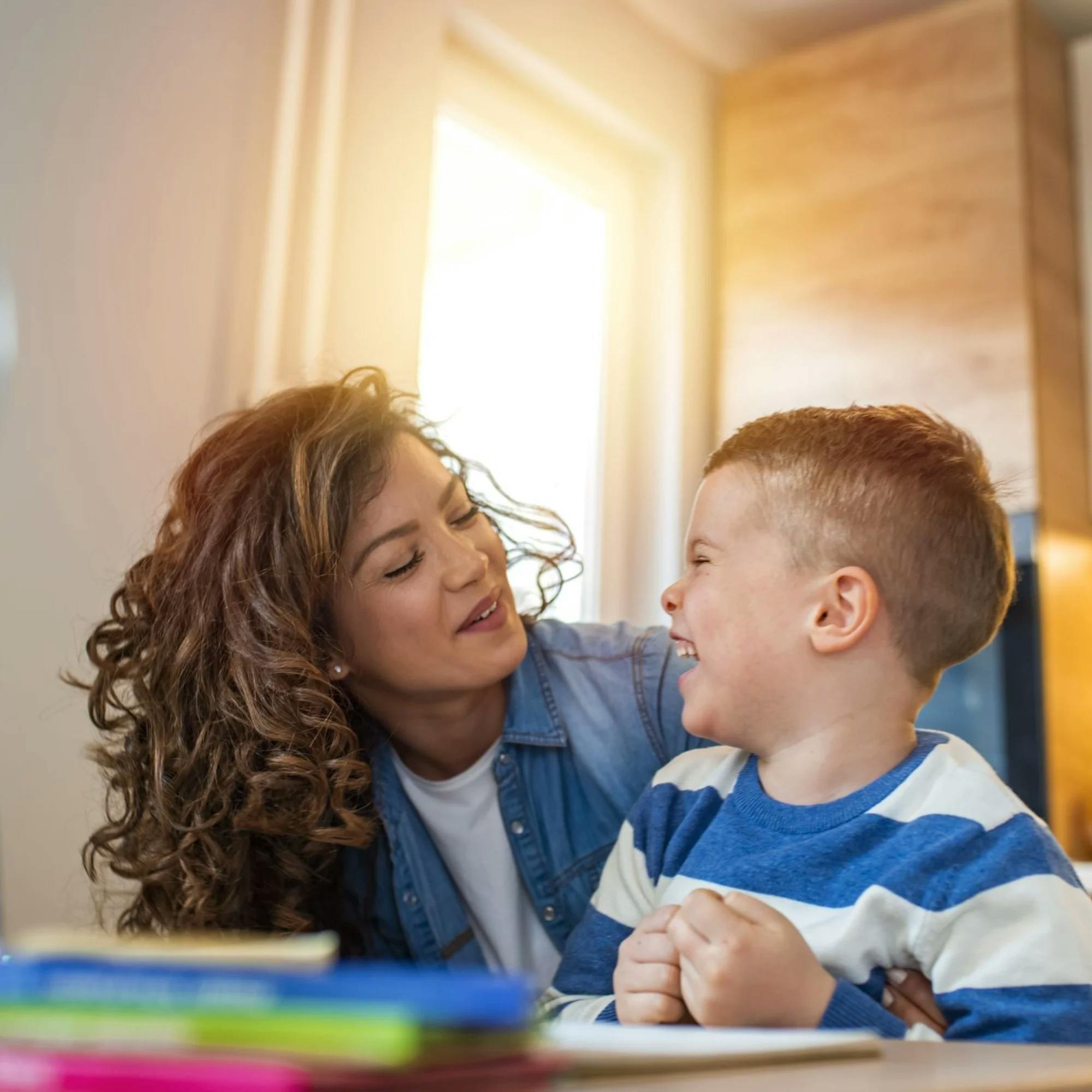It’s spooky season, and trick-or-treating is on the horizon. You might feel a bit uncertain about Halloween if your child is autistic, or if they have a speech delay or other communication difference. You may wonder, “How will my child be able to ask for candy?” “Will my child get frustrated?” “Will people notice their delay or react negatively?”
While it’s normal to have concerns like these, you and your child can still plan for a fun-filled All Hallow’s Eve. Read on for some practical tips to make this holiday as stress-free as possible for your little superhero, monster, or witch.
Knowledge is power
Take 5 minutes to check your child’s speech milestones with our free online screener.
 Start the screener
Start the screenerConsider your child’s current speech and language skills
If you’re worried about what your child won’t be able to do or say while trick-or-treating, take a minute to think about what they can do. Maybe they can’t say “Trick or treat” clearly, but they could give a very close attempt. Or maybe they can say “Hi!” more easily.
If your child isn’t talking yet, can they gesture, such as by signing “Please” or “More”?
No matter what your child’s special needs are, there’s likely a way they can communicate during trick-or-treating. We’ll cover some ways you can help them do this below.


Teach your child to trick-or-treat
There are a few ways you can help your child get ready for the big night. If your child has never been trick-or-treating, or if you’re not sure they’ll understand the concept, spend some time pretending to trick-or-treat. You can easily practice at home if you have another adult or a sibling present. One person can stay in a room behind a door, and the other adult can stay with the child. Have whatever bucket your child will use handy. (It’s up to you whether you use real candy or a healthier snack option!)
Start by modeling for your child what they should do. Knock on the door. When the other person opens the door, say, “Trick or treat!” and wait for candy to be placed inside the bucket. Then, start the process over and give your child a few turns.
If you have some friendly neighbors nearby, ask if your child could come practice trick-or-treating at their house, as well.
The more your child is able to practice before, the better they’ll understand what to do on Halloween. So practice as much as you’re able to!


Decide how your child will communicate when they trick-or-treat
While practicing trick-or-treating, you can work with your child to make a plan for how they’ll request candy. Here are some options to consider.
If your child is trying to say “Trick or treat,” go with their attempt! Even if it isn’t 100% clear, they’re doing their best. If you like, you can spend some time practicing how to say the phrase more clearly in the weeks leading up to Halloween.
If your kiddo isn’t able to say “Trick or treat,” let them use another word so they can practice verbalizing to request candy. They can practice saying “Please” or even “Hi!” when the person comes to the door. Be prepared that some neighbors may still wait for a child to say the traditional “Trick or treat.” If this happens, you can have a response ready to go, such as “They’re still learning to talk.” If you like, you can even say “Trick or treat!” for your child.
Put a sign on your child’s bucket that says, “Trick or treat! I am learning to speak!”
Another idea is to put a sign on your child’s bucket that says, “Trick or treat! I am learning to speak!” This is a great, low-key way to provide extra support for your child while they’re going door-to-door.
For children who can make requests through signs and gestures, you can use this ability on Halloween if you’d like your child to get more practice. Encourage them to use a sign like “More,” “Candy,” or “Please.” You can even place a sign on their bucket with a picture of the hand sign and what it means. And of course you can explain to the person answering the door, if needed.
Keep in mind: It’s unlikely that your child will have to request a treat at every single house, particularly if they’re with a group. Other children may say “Trick or treat” first, allowing your child to be part of the group receiving candy.
Expert language support
If your child has trouble expressing themselves or understanding others, a speech evaluation may be helpful. Take the next step today.
 Find a speech therapist
Find a speech therapist6 Halloween safety tips for children with speech delays
Safety is always important on Halloween, especially for children who have special needs or trouble communicating. In many areas, the streets are crowded with costumed children and the sun sets early. Follow these tips to help keep your kiddo safe:
1. Put your child’s name, your phone number, and any other contact information either in their costume or on some kind of identification item they can wear, such as a bracelet.
2. If your child is young, go up to each door with them. If your child is older, you may feel they can approach doors themselves or with a group. Just make sure you can keep an eye on them.
3. Some children with a speech delay are also delayed in their receptive language skills, such as following directions. Don’t let your child get too far ahead of you or walk too close to the street, as they may not readily respond to directions to stop or slow down.
4. Place reflective tape on the front and back of your child’s costume so drivers can see them in the dark.
5. Go with face paint instead of a mask so your child has clear visibility of their surroundings.
6. Wear something to distinguish yourself from the crowd so your child can easily find you.


Focus on the fun!
Holidays like Halloween are big events for kids, and they hold a special place in family memories. Don’t focus on what your child isn’t able to do, and don’t let it affect your child’s fun–or yours!
If you’re worried about your child’s speech delay drawing attention, realize that most people likely won’t even notice it. And if they do, that’s OK! Your child is who they are. They are unique, and they don’t need to be defined by the way they communicate. Just come prepared with a confident and calm response if anyone puts pressure on your child to speak. And start planning which candy bar(s) to sneak out of the bucket after your child’s in bed for the night. With all the planning and coordination that goes into holidays, you’ve earned it!
How Expressable Can Help
Concerned your child isn't reaching age-expected milestones? Looking for communication support from a professional? Expressable is a national online speech therapy practice serving children and adults. We treat all major areas of communication and feeding, offer flexible hours including evenings and weekends, and accept most major health insurance plans. We’re proud to have earned more than 3,000 5-star reviews from our clients (4.9/5 average).
Our therapy model is centered on parent and caregiver involvement. Research proves that empowering caregivers to participate in their loved one’s therapy leads to better outcomes. That’s why we combine live, 1-on-1 speech therapy with personalized education and home practice activities for faster progress.
Communication is more than words. It’s how we share how we feel and show who we are. We’re here to help you or your child do just that.
 Abby Barnes, M.S., CCC-SLP
Abby Barnes, M.S., CCC-SLP





